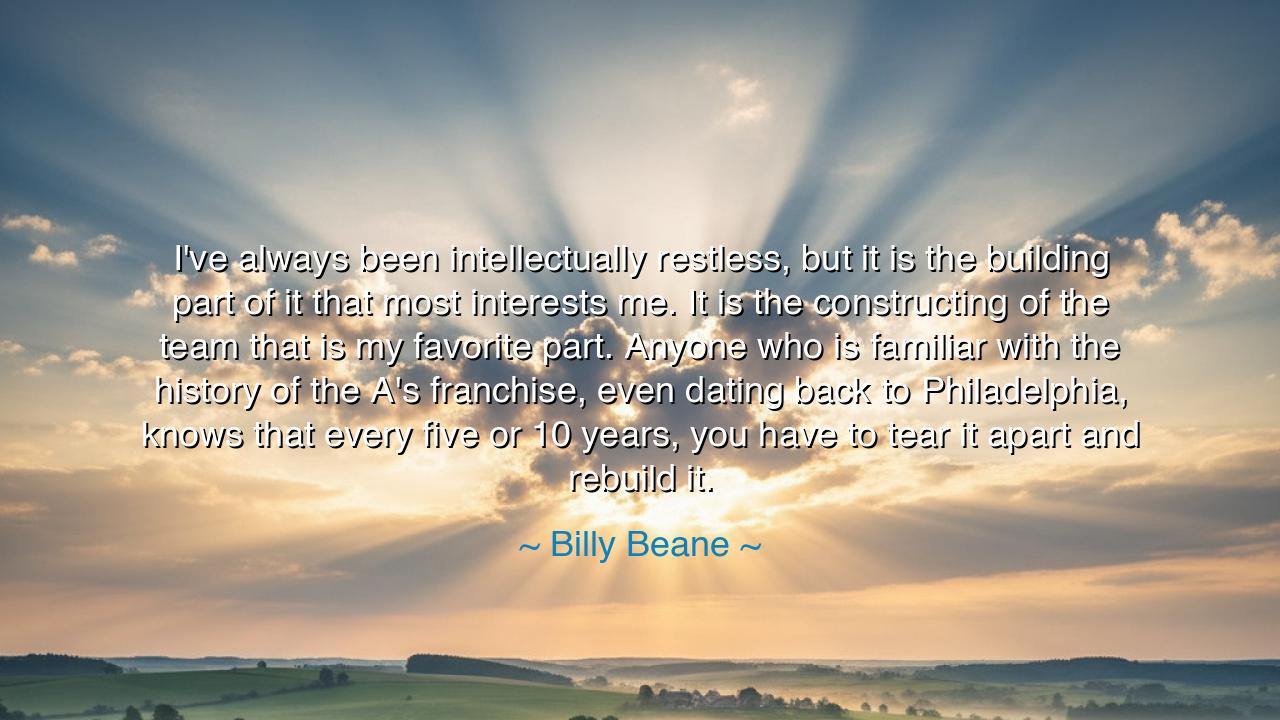
I've always been intellectually restless, but it is the building
I've always been intellectually restless, but it is the building part of it that most interests me. It is the constructing of the team that is my favorite part. Anyone who is familiar with the history of the A's franchise, even dating back to Philadelphia, knows that every five or 10 years, you have to tear it apart and rebuild it.





In the reflective and resolute words of Billy Beane, we hear not merely the musings of a baseball executive, but the wisdom of a builder of worlds: “I've always been intellectually restless, but it is the building part of it that most interests me. It is the constructing of the team that is my favorite part. Anyone who is familiar with the history of the A's franchise, even dating back to Philadelphia, knows that every five or 10 years, you have to tear it apart and rebuild it.” Beneath this reflection lies the ancient truth of creation and renewal—that nothing great endures without change, and that the joy of mastery lies not in possessing greatness, but in making it anew.
Billy Beane, the architect behind the “Moneyball” revolution, speaks here not as a mere manager of athletes, but as a philosopher of impermanence. His “intellectual restlessness” is the mark of a mind that refuses complacency—a spirit always searching for new ways to shape, refine, and reimagine. For Beane, the act of building a team is not mechanical labor but a form of artistry. Like the sculptor who sees the figure hidden within marble, he sees potential hidden within players overlooked by others. And yet, he acknowledges the necessity of the cycle—to tear down and rebuild, to let go of the old so the new may rise. His is a lesson not only for sport, but for life itself: that to cling to what was is to decay, but to rebuild is to live again.
The ancients, too, understood this sacred rhythm. The Greeks spoke of Prometheus, who dared to create humanity from clay and gift it the fire of reason, knowing that every act of creation demands both risk and renewal. The Romans, when their cities grew old or burned, built anew upon the ashes—believing that strength was born from endurance, not permanence. So too does Beane’s philosophy echo this lineage. The A’s franchise, from Philadelphia to Kansas City to Oakland, has long been marked by cycles of triumph and transformation. Beane’s insight—that greatness must be periodically dismantled—is a modern echo of an eternal principle: the cycle of destruction and rebirth that sustains all progress.
Yet there is something deeply human in his confession of restlessness. To be restless, in Beane’s sense, is not to be unsatisfied but to be alive—to possess the fire of those who cannot stop dreaming. The builder is never content with his last creation; his joy lies in the act of creating. Like the farmer who sows anew each spring, knowing that the harvest will one day fade, Beane accepts that success is not a monument, but a motion. He delights not in the stillness of victory, but in the movement of renewal. This is the spirit of innovation, of perseverance, of the artist and the architect, the leader and the craftsman.
Consider the ancient story of Theseus’s ship, preserved by Athenians through the centuries. As its planks decayed, they replaced each one until, at last, none of the original remained. Yet it was still called the Ship of Theseus. Philosophers asked: was it still the same ship? The answer, perhaps, lies in Beane’s words. A team, a work, a legacy—they survive not through unchanging form, but through the continuity of purpose. As long as there are those who rebuild with the same spirit, the essence endures. What is torn down can be rebuilt stronger, truer, more aligned with its vision. What matters is not the preservation of parts, but the persistence of passion.
In Beane’s world, rebuilding is not a tragedy—it is a discipline. It demands courage to release what once brought success, humility to recognize decline, and wisdom to see what might come next. This cycle of creation and destruction reflects not only the rhythm of teams and franchises, but of all human endeavors. Businesses, nations, even relationships must at times be remade. To resist this truth is to invite decay; to embrace it is to invite growth. The master builder, like Beane, learns to let go, to begin again, to find beauty in the process rather than the permanence.
So, my children of the future, take from Billy Beane’s teaching this enduring lesson: do not fear the fall of what you have built—fear the stagnation of never building again. When you create, give your whole heart. When time demands change, release it with grace. Be restless in your pursuit of purpose, yet patient in your practice of renewal. Whether you build a team, a business, a dream, or a life, remember that greatness lies not in holding what you have made, but in daring to make it again—stronger, wiser, and truer. For the world belongs not to those who cling to what was, but to those who, like Beane, find joy in the eternal act of building anew.






AAdministratorAdministrator
Welcome, honored guests. Please leave a comment, we will respond soon